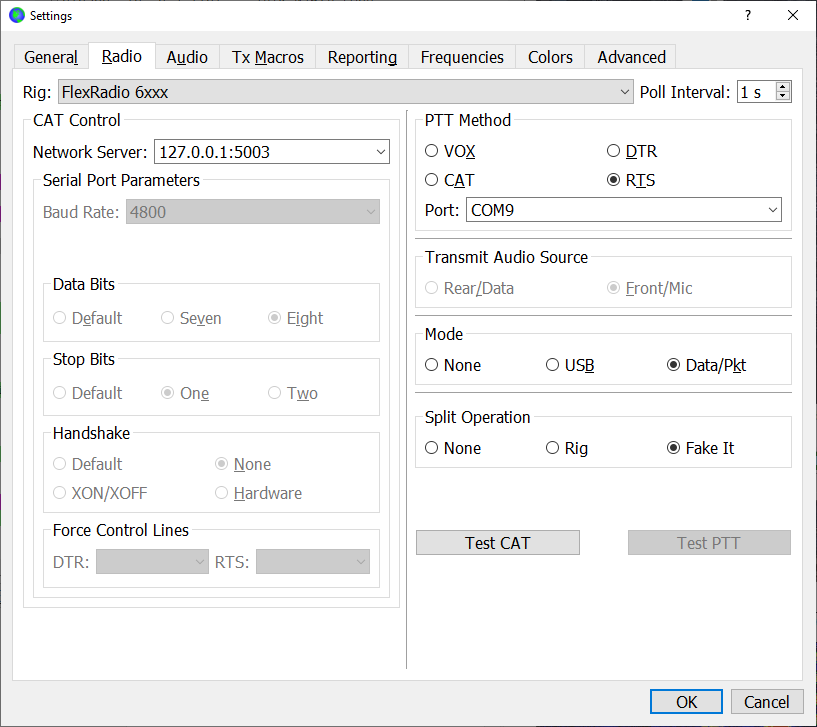SmartSDR v4.1.5 | SmartSDR v4.1.5 Release Notes
SmartSDR v3.10.15 | SmartSDR v3.10.15 Release Notes
The latest 4O3A Genius Product Software and Firmware
Need technical support from FlexRadio? It's as simple as Creating a HelpDesk ticket.
WSJT-X puts out only 25 watts
Running 6400M from front panel, not using ssdr. Ver 3.3.32 and Windows 10.
Set up WSJT-X and all was running fine, using about 15 watts out to drive the amp to about 200 watts. Using the Flex configuration in WSJT-X and radio mode is set to DIGU and width is 3.0K
Then the radio power out went down to about 2-3 watts. Turn the power output control up to 100 watts, xmit with WSJT-X and only get about 25 watts output. Recall a 100 watt global profile for cw and get 100 watts output.
In WSJT-X the power slider is all the way up and when I pull the slider down the power out changes as it should. Dax is working and shows the mic hitting about -2 or -3db, I think that is what Flex recommends. I can turn up the dax xmit slider and the mic level goes into the red and can hear distorion but the power output never goes above 25 watts even tho the radio power output is set to 100 watts. Go back to cw and get 100 watts output.
I made no changes to the setup before this change happened. Made a contact and logged it. Then called another station and got no response so I checked all the meters and I could see the amp is not being keyed cuz the radio is only putting out 2-3 watts when the power control is set at 15 watts. Turned the power up to 100 watts and the radio puts out 25 watts. Change mode to cw and the radio puts out 100 watts.
Powered off and rebooted both the radio (removed power for 2 minutes before reboot) and rebooted the computer, no joy. Works the same way on 10 meters as on 20 meters. Recalled a 10 meter global profile for cw and puts out 100 watts. Manually changed the mode to DIGU and it puts out 25 watts so it's not the profile.
What's going on? Any ideas?
Fred, K0FG
Comments
-
Fred
You may wish to open a support ticket for this. The good news is CW puts out 100 watts.
The puzzling part is that you are not getting 100% audio drive.
Mike
0 -
Thanks Mike I did create a ticket for it.
Fred, K0FG
0 -
Fred
A few things
Set DAX TX to level of 48. TX level should be at zero but yellow and not red.
look in WSJT-X TX frequency. Your TX frequency may be right on edge of TX passband.
In WSJT-X settings Radio tab make sure Fake It is selected along with Data/Pkt
Dave wo2x
0 -
The reason Dave mentioned to turn on Fake it was to make sure you are not trying to transmit outside your transmit bandwidth which is setup on SmartSDR.
As an example, if your High Filter cutoff is set to 2400hz and you are transmitting at 2350hz, then you will have reduced audio getting to the transmitter.
What was your WSJTx TX Audio Frequency? And what is your high and low cut set to?
Are they close to each other?
Mike
0 -
Set dax xmit level to 48 and that puts the mic level right at zero but has a little red in it so reduced it to 46, now only yellow, no red.
xmit bandwidth is set to 0-3000 for wsjt-x. Tried moving the xmit indicator in wsjt-x from 100-3000 and got full output no matter where it is located.
wsjt-x settings are set to data/pkt but had the split op set to none and all worked fine, this time. When I set the split op to fake it then whenever I xmit the freq display changes from 14.074 to 14.073.5, regardless of what the xmit freq shows on wsjt-x waterfall. Why would the freq go down when the xmit indicator is set to 3000 on the waterfall? The xmited audio pitch changes as I moved the xmit indicator but the freq always shows 14.073.5 when using fake-it.
Fred
0 -
That time I tried it and it moved the xmit freq to 14.074.5 cuz I had the xmit on the waterfall set to 2200 so I think it is working ok now.
I did check the hi/low and width and I think they were set a little to close together. Set the width from 0 to 3000.
Fred
0 -
Hi Fred,
Mike and I talked on the phone. For normal setup when using DIGIU you would want to set the transmit bandwidth to 0 on low cut and 3000 on high cut (in right panel on SmartSDR or by pressing in Mic Gain knob on Maestro or M series radio).
As Mike pointed out, If your high cut was 2700 and in WSJT-X your TX frequency was 2650 you are close to the edge of transmit bandwidth and it is normal to see a drop in WSJT-X Output power.
By using Fake It, WSJT-X will shift your transmit frequency so no matter what your audio TX frequency is in WSJT-X the radio will always transmit between 1500 and 2000 Hz, making sure you are not transmitting near the edges of the transmit passband.
73
Dave wo2x
0 -
I always run my TX bandwidth 0 - 4k to make shure I stay away from the filter edge.
0 -
Thanks for the help. Think it is setup properly now and it seems to be working well.
Fred, K0FG
0 -
Hi Fred,
Can you please clarify exactly what the conditions were that limited your output power as indicated in you original post? I would like to understand what was happening.
BTW, I never use Fake it. I can't see how it beneficial to me.
0 -
I guess we'll never know.
I think this kind of information could help others to avoid having the same problem.
0 -
From what I gathered from Fred’s posts and talking to Mike Walker, this is what I believe caused his issue.
- TX bandwidth set too narrow. Recommended 0-3000 Hz and DIGIU.
- Audio TX frequency set too close to edge of TX bandpass. If you are set 100-2700 on TX bandwidth and you WSJT-X TX frequency is say 2660 then you will have problems as WSJT-X signal is 60 Hz wide, starting at your audio TX frequency. 2660 + 60 = 2720 which would exceed the 2700 Hz high cut.
- Also as you approach the TX passband Edge the power will roll off. On most radios the TX high and low cut are expressed as the -6 dB points, meaning at the edges of your TX passband your signal is down 6 dB or 25% of your set power.
my recommendation of running the radio with radio settings on data/Pkt and Fake It do two things.
- Data/Pkt will force DIGIU mode which disables any EQ or processor resulting in a flat TX frequency response.
- Fake It will adjust radio TX frequency so TX audio tones going out will be between 1500 and 2000 Hz so even on narrow TX bandwidth settings it will still put out full power as not being near edge of TX passband. Not an issue with Flex set to 0-3000 but older radios it will make a difference. Plus on older radios the second harmonic of the TX tone frequency will fall outside the TX bandpass and not be transmitted over the air. This is sometimes observed if someone has levels cranked up too high of if you are receiving a station VERY strong.
- Another point of Fake It vs None. Hound Mode needs either Fake It or Split, so better to just use what the WSJT-X team recommends with Fake It.
Here’s a tip on receive. If you notice little to no decodes above 1500 or so (nothing in the 2500 to 3 KHz range) then check the WSJT-X waterfall and look at your default bandwidth. It should be 100 to 3000. This is set by adjusting the Bins/Pixel setting. The default is 2 and I’ve seen quite a few people not decoding the whole 3 kHz bandwidth. I use Bins/Pixel at 5 and NAvg at 2. Try it and watch number of decodes.
Dave wo2x
0 -
Hi Dave,
I never use Fake it and F/H mode works every time. I just set my transmit frequency above 1KHz.
Just sayin...
0 -
K, I am trying to remember use case where it would not work and required either Fake It or Split. maybe it was older versions. Hound mode requires the hound station to TX above 1 kHz. Fox does not listen below 1 kHz.
I will update my info about not requiring Fake It. I got so used to helping friends with non-Flex radios that I just use it. Doesn’t hurt to use it.
73
Dave wo2x
0 -
I guess I just like to be able to select my own frequency. Sometimes it helps to not step on another's signal.
I'm not sure it makes a difference but I think it may help. Of course I don't see what the other station sees so I might be fooling myself.
0 -
I watch the decoded stations to see what frequency they are transmitting on then choose a frequency where it seems there are not many stations. I then check the box “Hold Frequency” and it will keep me transmitting on that frequency.
Dave wo2x
0 -
I do the same
0 -
Sorry I'm slow answering your questions, wife wanted some chores done, "yes dear". I think the things I did to make wsjt-x work are as Dave and Mike answered earlier.
Bandwidth set too narrow. Maybe high and low frequencies set too close, don't know if that would affect it tho. I also turned on "fake it".
I think maybe the bandwidth was the limiting factor. All seems to be working now.
Fred, K0FG
0 -
Can you post a screen shot of SmartSDR and WSJTx while you are transmitting? It would help us review all your settings.
0 -
Here is a shot of my settings page.
Fred, K0FG
0 -
And here is a shot of my working page.
Fred, K0FG
0 -
Fred
Under "PTT Method," select "CAT" instead of "RTS." You will then no longer need a COM port.
Also, under "Split Operation," I use "None." I have seen various views on this, but "None" works for me.
Alan. WA9WUD
0 -
Hi Alan.. You are correct, I am now using "cat" rather than "rts" and it works fine. Thanks for the help.
I am using the split operation. Some say yes, some say no, so I don't know. Always used it on my Elecrafts so as long as it works I guess I can use it.
Fred, K0FG
0 -
When you set WSJT-X to use radio type Flex 6xxx and address 127.0.0.1:5004 (or whatever port you created for TCP CAT port), setting PTT to CAT goes through SmartSDR CAT, same as creating a PTT CAT port in SmartSDR CAT.
It is easier and more reliable to just set WSJT-X PTT to CAT.
Dave wo2x
0
Leave a Comment
Categories
- All Categories
- 386 Community Topics
- 2.2K New Ideas
- 650 The Flea Market
- 8.4K Software
- 151 SmartSDR+
- 6.5K SmartSDR for Windows
- 189 SmartSDR for Maestro and M models
- 437 SmartSDR for Mac
- 274 SmartSDR for iOS
- 263 SmartSDR CAT
- 202 DAX
- 383 SmartSDR API
- 9.4K Radios and Accessories
- 48 Aurora
- 289 FLEX-8000 Signature Series
- 7.2K FLEX-6000 Signature Series
- 964 Maestro
- 58 FlexControl
- 866 FLEX Series (Legacy) Radios
- 936 Genius Products
- 467 Power Genius XL Amplifier
- 343 Tuner Genius XL
- 126 Antenna Genius
- 306 Shack Infrastructure
- 215 Networking
- 466 Remote Operation (SmartLink)
- 144 Contesting
- 804 Peripherals & Station Integration
- 143 Amateur Radio Interests
- 1K Third-Party Software





